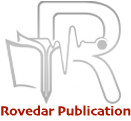Rovedar defines a competing interest as anything that interferes with the complete and objective presentation, peer review, editorial decision-making, or publication of a manuscript. Competing interests can be financial, professional, or personal, and can arise in relation to an organization or an individual, such as consultancies, employment, paid expert testimony, honoraria, speakers bureaus, retainers, stock options or ownership, patents or patent applications, or travel grants.
Rovedar requires all editors, authors, reviewers, and staff to disclose any potential conflicts of interest that might affect professional judgment as it relates to the editorial and peer review process of submitted manuscripts. Editors, reviewers, and authors are responsible for disclosing financial and other potential conflicts of interest that could potentially impact their submissions or reviews. Editors and Reviewers must complete the conflict of interest disclosure form. Authors must complete and upload the form that can be found in the Author Guideline section of journals at the time of manuscript submission.
Declaration of competing interests for
Editors and staff
The publisher must be informed in writing about any potential conflicts of interest by the editor before their appointment. These declarations should be updated if new conflicts arise and the publisher can make such declarations public in the journal. Editors must complete the conflict of interest disclosure form.
Editors are required to disclose any financial or financial relationships that might influence their judgment during the peer review process. If such conflicts arise, editors should excuse themselves from the process. Since it is impossible to anticipate every situation, editors must inform the editor-in-chief about any potential conflicts of interest with authors or reviewers when a manuscript is invited. If editors become aware of conflicts later on, they are obligated to inform the editor-in-chief. The editor-inchief will consult with the associate editors who are not affected by the conflict, and the affected editor agrees to abide by their decision.
The editor should not make decisions on papers they have authors, papers written by their family, colleagues, or papers related to products or services in which they have a vested interest. Such submissions must follow the journal’s standard procedures, and the peer review process must be independent of the author/editor and their research groups. Editors should apply Rovedar policy relating to the disclosure of potential conflicts of interest by authors and reviewers, e.g. the ICMJE guidelines.
Editors affiliated with Rovedar journals who are also serving on the editorial boards of other journals sharing similar goals and scope are expected to adhere to Rovedar’s policies while they are involved in editorial responsibilities at Rovedar journals. For such editors, it is important to declare any potential conflict of interest transparently. If at any stage of the journal’s peer review process, it becomes apparent that a submitted article is under consideration in a journal where our editor also serves, the Rovedar journal immediately reassigns the article to another editor. Similarly, if such a situation involves the editor-in-chief, and the editor-in-chief collaborates with another journal, the responsibility for handling that article is delegated to the second editor-in-chief/associate editor-in-chief/handling editor/managing editor. In case of a conflict of interest between the editor-in-chief and any of the mentioned roles, the article will be handled by one of the editorial board members.
Other editorial staff members involved in decision-making processes must inform editors of their current relationships or activities that could influence editorial judgments. If there is a potential conflict of interest, they must abstain from making decisions. Editorial staff are prohibited from using information obtained from manuscripts for personal gain. Editors and their journal staff must regularly disclose any potential conflicts of interest. Guest editors are also required to adhere to these guidelines.
Journals need to implement specific measures and establish clear policies for evaluating manuscripts submitted by individuals who are part of the editorial decision-making process.
Reviewers
Reviewers must be mindful of their personal biases and consider them when evaluating a paper. They should avoid criticizing the author personally and instead provide clear, well-supported feedback. Reviewers are required to consult the Editor if they have potential conflicts of interest due to competitive, collaborative, or other relationships with the authors, companies, or institutions associated with the paper. Reviewers must not use the content of the work they are reviewing before its publication to further their own interests.
Additionally, if a reviewer recommends citations to their own work or that of their associates, it should be based on genuine scientific reasons and not with the aim of boosting their citation count or increasing the visibility of their work or their associates. Reviewers must complete the conflict of interest disclosure form.
